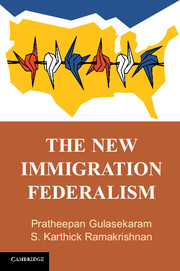Book contents
- Frontmatter
- Dedication
- Contents
- List of Figures and Tables
- Acknowledgments
- 1 Introduction
- 2 Setting the Stage for the New Immigration Federalism
- 3 Rise of Restrictive Legislation and Demographic Arguments of “Vital Necessity”
- 4 A Political Theory of Immigration Federalism: The Polarized Change Model and Restrictive Issue Entrepreneurs
- 5 A Shifting Tide in 2012: Pro-Integration Activists Gain the Upper Hand
- 6 Implications for Legal Theory on Federalism and Immigration Law
- 7 Immigration Federalism Is Here To Stay
- Appendix A Statistical Analysis of Restrictive Local Ordinances
- Appendix B Statistical Analysis of Restrictive State Laws
- Appendix C Statistical Analysis of State Immigrant Integration Laws
- Notes
- Index
3 - Rise of Restrictive Legislation and Demographic Arguments of “Vital Necessity”
Published online by Cambridge University Press: 05 November 2015
- Frontmatter
- Dedication
- Contents
- List of Figures and Tables
- Acknowledgments
- 1 Introduction
- 2 Setting the Stage for the New Immigration Federalism
- 3 Rise of Restrictive Legislation and Demographic Arguments of “Vital Necessity”
- 4 A Political Theory of Immigration Federalism: The Polarized Change Model and Restrictive Issue Entrepreneurs
- 5 A Shifting Tide in 2012: Pro-Integration Activists Gain the Upper Hand
- 6 Implications for Legal Theory on Federalism and Immigration Law
- 7 Immigration Federalism Is Here To Stay
- Appendix A Statistical Analysis of Restrictive Local Ordinances
- Appendix B Statistical Analysis of Restrictive State Laws
- Appendix C Statistical Analysis of State Immigrant Integration Laws
- Notes
- Index
Summary
The most notable legislative attempts at immigration restriction prior to 2001 occurred in California. The state had already pioneered modern employer sanctions law for the hiring of unauthorized workers in 1970. Later, not only did voters pass Proposition 187, a 1994 measure that sought to deny public benefits to unauthorized immigrants, the state legislature also passed a slew of other restrictive laws in 1993, including measures barring unauthorized immigrants from obtaining driver's licenses, mandating cooperation between state prisons and federal immigration authorities, and mandating employment agencies to verify the immigration status of applicants before providing them with job placement or training. At the local level, too, controversies had emerged in suburban areas of Los Angeles such as Monterey Park, where local conflicts over the proliferation of Chinese-language business signs grabbed news attention and prompted the city council to consider and enact legislation mandating the addition of English signage in the mid 1980s. Controversy over the visible growth of Asian businesses also emerged in the northeastern suburbs of New Jersey during the 1990s, where voters in cities like Palisades Park pushed their city council to pass ordinances that disproportionately affected Asian immigrant businesses, mandating that karaoke bars close by 9 pm, and requiring the inclusion of English in store signs.
While states such as California and New Jersey had dominated news headlines on immigration restriction in the 1990s, the following decade brought forth another set of venues where immigration restriction was prominent. After a period of relative state and local quietude on immigration following the 1996 federal immigration overhauls, the post-9/11 era once again reignited immigration federalism. Soon after 9/11, localities began using a relatively obscure and dormant part of the 1996 federal immigration overhaul. The so-called 287(g) agreements, named for the section of the INA that provides authority for them, allow local law enforcement and federal authorities to enter into memoranda of understanding with federal officials that empower local officials to be trained in, and enforce, federal immigration law. Notably, despite providing for the possibility of supervised and delegated local enforcement of immigration laws in 1996, localities did not begin entering into such agreements with much frequency until after 2005, with political battles on immigration heating up both nationally and locally. The increase in 287(g) agreements during that time was indicative of a larger trend.
- Type
- Chapter
- Information
- The New Immigration Federalism , pp. 57 - 86Publisher: Cambridge University PressPrint publication year: 2015



